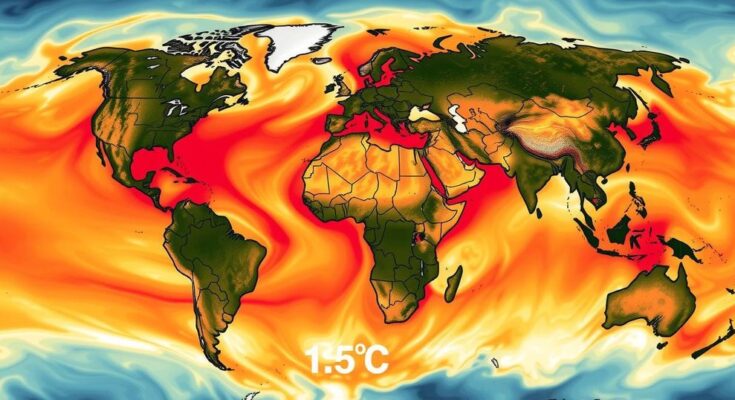In 2024, global temperatures reached a critical 1.5°C above pre-industrial levels for the first time, primarily due to El Niño and anthropogenic warming. This rise resulted in severe heatwaves and catastrophic weather events worldwide, with significant implications for ecosystems and human populations. Experts advocate for immediate action to reduce emissions and adapt to growing climate challenges to prevent irreversible damage.
In 2024, the global average temperature surpassed the critical threshold of 1.5°C above pre-industrial levels for the first time, as reported by the EU’s Copernicus Climate Change Service. This alarming temperature rise, attributed to both a strong El Niño phenomenon and human-induced climate warming, has resulted in unprecedented heatwaves, wildfires, and other extreme weather events, particularly affecting regions such as Europe and Asia. On July 10, approximately 44% of the Earth experienced severe heat stress, indicating the widespread nature of these climate impacts.
The increase in atmospheric moisture has also contributed to catastrophic flooding, with significant incidents occurring in Valencia, Spain. Researchers emphasize that even slight increases in temperature can escalate the risk of irreversible environmental damage, including the potential loss of ice sheets. The report makes it clear that immediate and robust actions are essential to mitigate emissions and prepare for the intensifying realities of climate change.
Climate change has emerged as one of the most pressing global challenges, with various scientific bodies warning of its accelerating impacts. Temperature thresholds outlined in the Paris Agreement aim to limit global warming to well below 2°C, with a preferred aim of capping the rise at 1.5°C. Exceeding this threshold, even temporarily, could signal severe consequences for ecosystems and human communities alike. The year 2024 has brought attention to this urgent issue, particularly with the onset of strong climate phenomena, such as El Niño, which exacerbate these effects.
In summary, 2024 has underscored the urgent reality of climate change, marking the first instance where global temperatures exceeded the 1.5°C threshold above pre-industrial levels. The consequences are being felt globally, with extreme weather events and climatic disturbances highlighting the need for swift and decisive action. Immediate efforts to cut greenhouse gas emissions and adapt to ongoing climate extremes are essential to safeguard our planet’s future.
Original Source: www.africa.com




